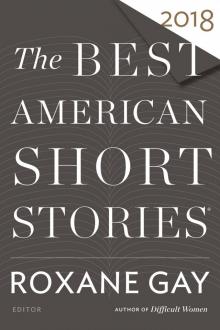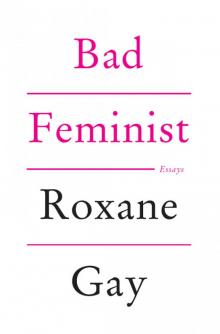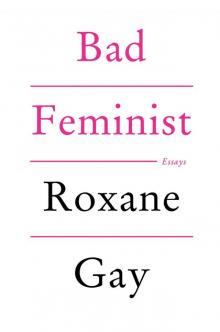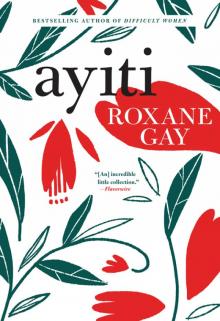- Home
- Roxane Gay
Difficult Women Page 16
Difficult Women Read online
Page 16
She never stays with one man too long, says she lives vicariously through me as I do through her, so she doesn’t need to get married and I don’t miss being single. She’s always calling me to tell me about a man she met in a bar or at a bookstore or in line at a coffee shop and how that man ended up in her bed and occasionally in her heart. When she visits, she fools around with my husband’s best friend, a guy named Grant, a powder monkey on my husband’s logging crew who thinks he and my sister share something so special it keeps her coming back. The four of us like to go bowling. We drink and bowl and drink and bowl and then we go down by the lake with a case of beer and make out on wooden park benches like teenagers with nowhere else to go. When I shiver after my husband slides his big hands beneath my shirt, she moans, and when she spreads her legs and pulls Grant’s hand into her pants, I clench my thighs. People ask us if we have some kind of special connection. We lie and tell them we don’t.
The wives of loggers tell stories about men broken by falling limbs or treetops or loose chain saws—they call these things widow makers. I listen to these stories and think, if something happened to my man, I would cut down every tree I ever saw for the rest of my life. I am a knife. When my husband is late coming home from work, I start to feel uneasy. I imagine our empty home even emptier than it already is. I make sure the phone is working, that I haven’t missed any calls, and when he does get home, I beat his chest with my fists. I damn him for making me worry. Most nights he comes home smelling of sweat and sap, sometimes sawdust if he’s been in the mill. He takes his dirty work boots off and undresses in the mudroom. I watch him, leaning in the doorway, holding a cold beer. He always smiles at me, no matter how his day has been. He takes a long sip of his drink, kisses me, his breath warm and yeasty. I tell him how lonely my body has been without him all day. He presses his lips against my neck, pulls at my skin with his teeth. He is a gun. I am a knife.
When she calls, I can hear in my sister’s breathing, before she says a word, that something is wrong, I sit down at the kitchen table. My husband is in the family room watching some documentary on helicopter loggers, complaining loudly about how they’re doing everything wrong. “What is it?” I ask. I try to sound calm. My skin hurts. My sister says, “I’m pregnant,” and I exhale slowly. I say, “It’s going to be okay.” I swallow something hard and mournful. I dig my fingernails into the palms of my hand. I am a knife. She says, “I understand,” and I smile and hold my stomach, running my fingers along the slightly raised scar that refuses to disappear even though it has been some time since I was cut open. I am not a knife. “Can I come stay with you while I figure out what I’m going to do?” she asks even though she doesn’t need to ask. We talk awhile longer, then I join my husband. I sit on his lap and burrow my head against his chest. I tell him my sister is coming and why and he holds me so tight that even hours later, when we’re in bed and he’s asleep, I can feel him holding me together.
My sister and I were once in a car accident while she was visiting. We were sideswiped by a drunk driver on a backcountry road, the only kind of road up here. There were high stalks of corn lining either side of the road and bugs were everywhere, their high-pitched humming making the night thick. My sister was unconscious, her pulse weak. The drunk driver was passed out, an angry cut pulsing along his hairline. He reeked of cheap wine. The stench of him made me throw up. I pulled him toward our car. He was so heavy it felt like my shoulders might separate from my body as I pulled and pulled and pulled. When we reached my sister, I fell to the ground, sweaty and out of breath. I pressed two fingers to my sister’s neck. She was born seven minutes after me. She could not die before me. Her pulse was even weaker. Her heart was dying. My heart was dying. I cut the drunk driver’s chest open. I am a knife. I reached into his body, wet and warm, and I pulled out the heart he did not deserve. I felt no sadness or mercy for him as the slick organ throbbed in the palm of my hand. I cut my sister’s chest open. I am a knife. I put his heart into her chest next to her heart. The two hearts nestled together and began beating as one. I am a knife. I pulled the flaps of skin back over her open chest and said a silent prayer as her skin fell back into place. I held my sister in my arms until help came. I kissed her forehead and whispered acts of contrition into the night air so she would know she was not alone. I kept her warm and safe.
With my sister around, the house feels less empty. She makes a small home for herself in one of our empty rooms. Her stomach swells and her skin glows. I often catch her walking around our property humming to herself, holding her belly. She is changing. I am not. Sometimes I catch my husband staring at her. When he notices me watching him watching her, he blushes, looks away guiltily. One night, we are lying in bed. We have just made love and he is still lying on top of me. He is still inside me. He brushes my hair out of my face and kisses me hard and I kiss him back and we bruise each other with our mouths. He says, “I wish we could take the child growing in her and put it inside you, where it belongs.” I hate him for saying this. I love him for saying this.
Grant stops by almost every evening to check on my sister. He is convinced the child is his. He is not wrong. He brings her clothes for the baby, soft blankets, the food she craves, an expensive stroller. When she is in a good mood, she lets him stay the night. She says he is a comfort. She loves his hands and his voice and the thick mat of hair on his chest. She says she doesn’t know if that is enough. I tell her it could be. When I hear them laugh, when I see how he looks at her, there is a loud, painful ringing in my ears that does not go away until I punch myself in the stomach. I imagine reaching into my own belly, cutting out the damage because I am a knife.
Her belly grows and grows and grows. Her ankles swell. She walks slower and slower, holding her lower back. Her skin still glows. Toward the end of March, we sit on the porch. It won’t be long before she gives birth. She says, “I love this thing inside of me but I want it out.” She stretches her legs and groans, then leans against my shoulder. She takes my hand and holds it over her stomach, covering my hand with hers. She says, “You are a knife.” She is asking me something. Her belly is firm and warm and I can feel the baby moving around in its amniotic sac. The child is a boy or a girl. The child is strong. Its mother has two hearts. She asks, “What is it like, giving birth?” I say, “It feels like something wild is tearing your body from the inside out.” She closes her eyes, squeezes my hand harder. The scar across my belly splits open and blood dampens my shirt but I sit still, I sit with my sister. She needs this from me.
A piercing scream in the loneliest part of the night wakes me up. My husband leaps out of bed, his hair standing on end, his boxers hanging loosely around his waist. He looks around the room, his fingers balled tightly into fists. He is a gun. His eyes are bright white. We hear another scream. I get out of bed. The floor is cold. I go to my sister’s room. She is sitting up in bed, sweating heavily, her long hair clinging to her face. She looks at me, her eyes clouded with fear. Grant is holding his phone. He says, “I called for the ambulance but it will be hours before they can come.” This is how life is in the North Country. There is never the kind of help you need when you need it. My husband and I know all too well what happens when the only ambulance in four counties is hours away. You end up bleeding in the cab of a pickup while your child dies inside you, while your husband speeds to the hospital, an hour away, over icy, winding backcountry roads, crying because he knows he cannot get you there in time. I place my hand on Grant’s arm. I say, “Leave us,” and my husband pulls Grant out of the room.
I kneel on the bed next to my sister. I think about how I am holding her life. I say, “Close your eyes,” and she does. She trusts she is safe with me. I am a knife. I drag my fingernail across her lower abdomen and her skin parts easily. There is so much blood. I cut through the layers of dermis, the fat, yellow, soft globes that fall away loosely. I am careful. I am sharp. When I reach the uterus, I am gentle and neat, making another horizontal cut. There is still so much blood.
I see the dark head of a child covered in thick fluids. I pull the child free, it is a boy, and he is followed by a long cord of slick membrane. I cut the boy free from the cord, hold the dirty little creature against me as my sister lies quietly, cut open, there is so much blood. My sister waits, she still trusts me. Her boy is hot in my arms. When he opens the slits of his eyes, I bite my tongue until I taste blood. I look at this boy, his tiny fingers curled, his limbs narrow and long, and it hurts to think of all the moments he will have. I am angry. I am a knife. I wish I could carve the anger out of my body the way I cut everything else. My sister holds her arms open. She trusts me.
That night, in the cab of his truck, the heat wouldn’t work so every breath made my chest ache. I bled all over the seat and held my husband’s thigh and shivered and forgot what warmth felt like. He refused to look at me but over and over he said, “I will get you there.” The wild thing inside me was trying to get out and the pain was clear and constant and remarkable. I said the last prayer I would ever pray. At the hospital, my husband carried me inside. He explained to the doctor I was due any day. He said, “Everything’s going to be okay, right?” The doctor ignored him. The doctor cut me open and hollowed me out and left an ugly scar, country medicine. He pulled from my womb a frail, bloody girl who could not breathe on her own, could not cry. Her head was strangely large, her skin almost translucent, as if we could see right through her. She was a wild thing but did not live long. We gave her a name.
The night after my nephew is born, after I cut my sister open and hold her life in my hands and close the wounds I made to save her child, my husband fucks me in our bed while my sister and a man and a baby boy sleep in her bed. My husband and I are loud and violent with each other. When I bite him, I draw blood. I am a knife. He fucks me like he’s trying to fix everything broken inside me, like he’s trying to break me even more, like he is trying through will alone to create another life inside what is left of my womb. I believe through him all things are possible. I wrap my arms around his back. I press my knees against his ribs. We do not look away from each other. His every thrust hurts more, hurts everywhere, but I spread my legs wider, open myself more to him. I am a knife.
The Sacrifice of Darkness
I.
When I was a young girl, my husband’s father flew an air machine into the sun. Since then, the days have been dark, the nights bright.
That man who needed to reach the sun, Hiram Hightower, worked his whole life underground, mining, digging through the hard earth to make other men wealthy, to fill their homes with fine things, to clothe their wives with fine linen and silk, to feed their mouths with fine food. He worked the unyielding earth until his lungs blackened and his bones swelled from the pressure of the world bearing down on him day after day after day.
As a young man, Hiram did not mind spending most of his waking hours in the world beneath the world. “It was always a mystery,” he said when my husband was a young boy, “to sift the earth through my fingers, looking for the glint of precious metals.” As the years passed, though, there was less and less mystery. In the morning, he drank coffee from a tall thermos as he drove to the mine. He put on his coveralls and heavy jacket and took the elevator down into the mine. He clawed through clay and granite always searching for something precious. He shivered as the cold sank into his skin. Sometimes he’d find feldspars and hide them in his pockets. He’d take them home and buff them to a perfect shine for his wife, who kept them on the mantel above the fireplace. Those crystal formations were the only beautiful things he gave to his wife, other than their child, so she treasured them in the way of women who love hard men.
The air in the mine was terrible. After too long, a man couldn’t breathe down there. By the end of each day, as the miners rode the slow mile back to the surface, back to fresher, thicker air, they clutched their chests with trembling hands. Most nights when he got home, Hiram was silent, had nothing to say, knew his family would never understand that each time he went down below, he was forced to leave a piece of himself behind, knew that someday, there wouldn’t be enough of him left to come home. He ate the food his wife set before him—hearty fare, well-seasoned meats, freshly baked bread, vegetables from the garden she tended. His wife, Mara, always had a smile for Hiram, sat with him patiently, sat through his silence, pretended each night that she was not sharing her table and her bed with a lesser man than the one she had known the night before.
Hiram had lovely hands, Mara has told me many times. His hands could fill a woman with fear if she didn’t know better. You could see the strength of them in the thick web of skin and muscle and vein and bone. His whole body was a thick rope of muscle and sorrow. When they were alone, Mara liked to lie on his back, the broad, warm expanse of it. When she kneaded his body with her fingers, he groaned loudly, said, “Woman, you make me never want to leave your side.” Mara never feared Hiram, wasn’t worried about the size of him. He wasn’t gentle when he touched her but he was a good man. He touched her the way she wanted to be touched. She loved how he knew there was strength in her, too.
Something changed in Hiram when he turned forty. He had always been a quiet man, but on his birthday, he became silent. All he could think about each night was how, sooner than he could bear, he would have to go back down into the cold, thin air and the cramped tunnels and the dirt falling into his eyes and nose and mouth, choking him, breaking him. At night Mara stretched herself alongside her husband trying to coax a word from his lips but he could not give her the one thing she needed from him. She started to forget the sound of his voice. He still went to work, still clawed through the earth, still filled the rusty carts with the precious, shiny metals greedier men craved. There was no joy in it, though, none at all. It became harder and harder for him to stand tall or take a deep breath.
One morning, he woke up and realized he could not spend another minute, day, or hour in the dark, thin air of the world beneath the world. His wife shook his shoulder when the alarm sounded. The sun rose but Hiram did not get out of bed. He sat up, leaning against the iron headboard. He nodded toward their bedroom window, asked Mara to tear the curtains down. His request was strange but Mara was so grateful to hear her husband’s voice, she did as he asked. She grabbed the length of cloth and pulled the curtains to the floor with one fluid movement. Two jagged holes were left in the wood of the wall but neither Hiram nor Mara minded. Hiram patted the empty space next to him and Mara went to her husband. He looked right into the sun with his wife by his side. He didn’t look away even when his skin warmed uncomfortably. Later, after their boy went to school, Hiram pressed his lips to Mara’s bare shoulder and turned her over and followed the bony knots of her spine from the length of her neck down. He slid his strong, lovely hands along her thighs, smiling as they trembled against his touch. She rolled onto her back and when he pressed her body into hers, she sighed. She gave in to the weight of him. He held her face between his hands like he might crush her skull. The pressure of his hands made her head throb, almost pleasantly. When Hiram kissed Mara that morning, her lips swelled and bruised, threatened to split open and spill. Her lips felt pulpy against his, beautifully misshapen. The whole of her body felt that way by the time he was done, as if every muscle, every part of her skin, had been worked through his hands and his mouth and his eyes until it was broken all the way down.
When Mara climbed out of bed, sore, heavy, drained, Hiram said, “Don’t wash,” so she didn’t. She went to the kitchen and prepared him a sandwich with thick sliced meat and tomato, a glass of cold milk. She smelled him everywhere, felt him everywhere. When he was of a certain mind, the weight of him was inescapable. Mara loved that about her husband. Hiram joined her in the kitchen and ate slowly. He stared at her in a way that made Mara feel like she was sitting across from a stranger. He did not look away. She did not look away. She tried to ignore the soft ache in her chest that bloomed, slowly, into a nervousness she couldn’t quite make sense of. When Hiram finished, he stood and took his
plate to the sink, washed it clean, dried it carefully, set it on the counter. He looked out the window above the sink, out into Mara’s garden, into the thicket of trees beyond. He squinted as he looked up, toward the sun.
“There’s something I must do,” he said.
Mara shook her head. “Don’t you break my heart, Hiram. Don’t you dare.”
He reached out and Mara slid her hand into his. Hiram led his wife outside and they stood on the slab of stone behind their house. He pointed up at the sun. “I want to touch it, just once. I need it, woman, I just do, and there’s nothing that’s going to stop me from trying to get there.”
That afternoon, Hiram drove to the nearest purveyor of air machines with a good portion of the money he had earned by making money for other men. The coins were heavy in the satchel he carried. The weight of them tired him but he had important business to attend to. He needed to fill the impossible emptiness inside him. Hiram listened as the salesman tried to sell him a fancy air machine with linen seats and slick lines but that’s not what he needed. He needed something strong, sturdy, an air machine that would carry him a long, long way. It was an ugly thing, the air machine he bought. There was no grace to it but he loved the color—a bright red that would make the sky pretty. As he walked around the fuselage, Hiram wondered how something so ungainly could take flight but the salesman assured him the air machine would serve him well. The salesman was a man of his word.
II.
I grew up in a valley flanked by two hills some called mountains. We weren’t much used to the sun anyway. That’s what we tell ourselves now that the sun has been gone so long. Our town was small but pretty, or at least, that’s how I always saw it. Pretty isn’t always about what you see. Sometimes pretty is what you feel. Minus the people, our town is still pretty to me. There were lots of trees towering over every house and building. As a child, I thought those trees reached straight into the heavens. I still do. I don’t much change once I set to feeling a certain way. The streets were and still are lined with wooden sidewalks, sturdy and rough-hewn, raised a few feet off the ground because most folks around here don’t trust the ground knowing what they know about what lies beneath, what that world beneath the world can take from you, has taken from all of us. The mine owners live near the center of town like they want their grand homes to be seen from everywhere, all steel and glass reaching toward the sky, almost as high as the trees, sprawled across wide stretches of land. In the shadow of those grand homes are where the rest of us live, some of us in the valley, others in the wooded hills, where the air is sweeter and the land is harder but means more. On the edge of the town are the mines, their entrances carved into the slow stone rise of the hills.

 Graceful Burdens (Out of Line collection)
Graceful Burdens (Out of Line collection) The Best American Short Stories 2018
The Best American Short Stories 2018 Bad Feminist
Bad Feminist Bad Feminist: Essays
Bad Feminist: Essays Ayiti
Ayiti Difficult Women
Difficult Women An Untamed State
An Untamed State Hunger
Hunger